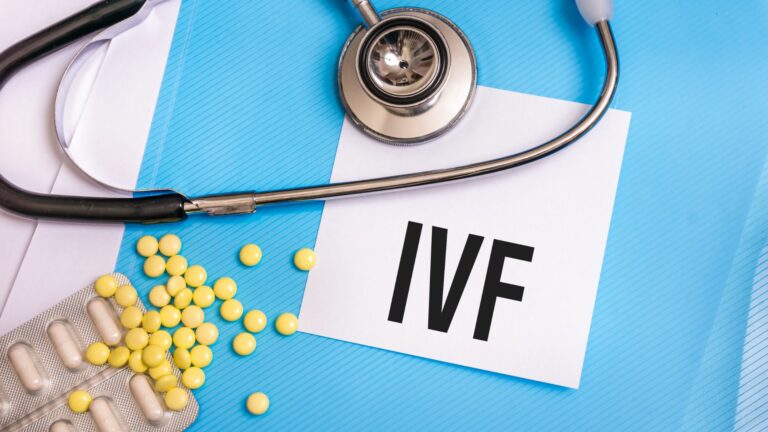
Pregnancy after IVF is a momentous milestone, marking the successful end of a challenging journey and the exciting beginning of a new chapter.
As you transition from fertility treatments to prenatal care, you may find yourself riding a wave of emotions – joy, relief, and perhaps a touch of lingering apprehension.
Rest assured that these complex feelings are entirely normal, and with the right support and care, you can look forward to a healthy, happy pregnancy.
Key Takeaways:
| Aspect | Key Points |
|---|---|
| Emotions | – Mixed emotions are common and valid – Seek support from loved ones and professionals |
| Risks & Monitoring | – Slightly higher risks, but still relatively low – Specialized monitoring helps manage potential complications |
| Medications | – Consult your doctor to safely transition off fertility meds – Follow instructions for new prenatal medications |
| Nutrition | – Focus on a balanced diet rich in essential nutrients – Stay hydrated and nourish your body for a healthy pregnancy |
Navigating Potential Risks and Specialized Care
While IVF pregnancies are associated with slightly higher risks compared to naturally conceived pregnancies, it’s crucial to keep in mind that these risks remain relatively low overall. Some potential complications to be aware of include:
- Multiple pregnancies due to transferring more than one embryo
- Increased likelihood of premature labor and delivery
- Higher incidence of preeclampsia, a pregnancy complication involving high blood pressure
- Slightly elevated risk of certain birth defects
To help manage these risks and ensure the best possible outcomes, your healthcare provider will likely recommend specialized monitoring throughout your pregnancy.
This tailored approach to prenatal care may involve:
| Monitoring Type | Purpose |
|---|---|
| Frequent ultrasounds | Track baby’s growth and development, monitor for multiples |
| Additional blood tests | Screen for gestational diabetes, preeclampsia, and other conditions |
| Specialist consultations | Provide expert guidance from maternal-fetal medicine experts or high-risk obstetricians |
Understanding the increased surveillance and care you’ll receive can help alleviate some of the anxiety surrounding IVF pregnancies.
Your doctor will work with you to create a personalized monitoring plan, which may include:
- Early and frequent ultrasounds in the first trimester to confirm the pregnancy’s viability, establish an accurate due date, and check for multiples.
- Prenatal diagnostic tests like chorionic villus sampling (CVS) or amniocentesis, particularly if you have a higher risk of chromosomal abnormalities due to factors such as advanced maternal age or family history.
- Nuchal translucency (NT) screening, which combines an ultrasound with a blood test to assess the risk of Down syndrome and other chromosomal issues.
- Heightened surveillance if you’re carrying multiples, as multiple pregnancies come with their own set of potential complications.
Medication Management: Safely Transitioning from IVF to Pregnancy
As you shift from IVF to pregnancy, navigating the world of medications can feel overwhelming.
However, with guidance from your doctor and a clear understanding of the process, you can confidently manage your medications for a smooth, healthy transition.
Step 1: Schedule a comprehensive prenatal visit
Discuss all current medications with your doctor, including:
- Fertility medications (provide specifics on dosage and duration)
- Over-the-counter drugs (don’t assume they’re all safe during pregnancy)
- Vitamins and supplements (some prenatal vitamins may cover your needs)
Step 2: Safely transition off fertility medications
- Work with your doctor to gradually taper off or discontinue fertility meds
- Understand the rationale behind each medication change
- A personalized plan ensures a smooth hormonal transition for a healthy pregnancy
Step 3: Introduce new prenatal medications as needed
- Begin taking prenatal vitamins to support your baby’s development and your well-being
- Your doctor may prescribe medications for morning sickness, gestational diabetes, or other pregnancy-related issues
- Strictly adhere to dosage, frequency, and duration instructions for any new medication
Resources for further information:
- The American College of Obstetricians and Gynecologists (ACOG)
- The National Institutes of Health (NIH)
- March of Dimes
Tips for medication management:
- Maintain open communication with your doctor about any concerns or questions
- Keep a comprehensive list of all medications, including dosage and frequency
- Avoid self-medication and always consult your doctor before starting any new drugs
Nourishing Your Body for a Healthy Pregnancy
Eating a well-balanced diet is crucial for supporting your health and your baby’s development throughout your pregnancy after IVF.
Focus on incorporating a variety of nutrient-dense foods to ensure you’re getting all the essential vitamins and minerals you need.
Pack a Balanced Plate:
- Include plenty of fruits, vegetables, whole grains, lean proteins, and healthy fats in your meals
- Use the MyPlate tool by the USDA as a guide for creating balanced meals
Don’t Forget Folate:
- Continue taking prenatal vitamins with at least 400 micrograms of folic acid daily
- Folate is essential for preventing neural tube defects in your baby’s brain and spine
- Learn more about the importance of folic acid during pregnancy from the National Institutes of Health (NIH)
Pump Up the Iron:
- Iron is crucial for carrying oxygen to your baby and throughout your body
- Include iron-rich foods like lean red meat, beans, lentils, leafy greens, and fortified cereals in your diet
- The American College of Obstetricians and Gynecologists (ACOG) provides information on anemia and iron deficiency during pregnancy
Build Strong Bones with Calcium:
- Aim for 1,000 milligrams of calcium per day to support the development of your baby’s bones and teeth
- Good sources of calcium include dairy products, leafy greens, and calcium-fortified foods
- March of Dimes offers a resource on calcium intake during pregnancy
Stay Hydrated:
- Drink plenty of water throughout the day to support various bodily functions and maintain optimal hydration
When making changes to your diet, remember to:
- Consult your doctor for personalized guidance based on your individual needs and preferences
- Start with small, manageable changes and gradually incorporate healthier foods and habits
- Surround yourself with a supportive network to help you stay motivated and on track
Moving Your Body: Safe and Beneficial Exercise During Pregnancy
Engaging in moderate-intensity exercise during IVF and throughout your pregnancy can provide numerous benefits, such as improved circulation, better mood, and easier management of weight gain.
However, it’s essential to consult your doctor before starting any new exercise regimen or significantly increasing your activity level.
Pregnancy-Friendly Activities:
- Walking
- Swimming
- Prenatal yoga
- Low-impact aerobics classes
Tips for Safe Exercise:
- Listen to your body and stop if you experience pain, discomfort, or unusual symptoms
- Stay hydrated and wear breathable, supportive clothing
- Avoid activities with a high risk of falling or abdominal trauma
- Modify your routine as your pregnancy progresses and your body changes
Managing Stress for a Serene Pregnancy
Finding effective ways to manage stress is crucial for your physical and emotional well-being during your pregnancy after IVF.
Incorporating relaxation techniques into your daily routine can help you stay calm, centered, and better equipped to handle the challenges of pregnancy.
| Technique | Benefits |
|---|---|
| Deep breathing | Promotes relaxation and oxygenation |
| Meditation | Calms the mind and reduces anxiety |
| Mindfulness | Encourages present-moment awareness and stress reduction |
| Gentle yoga | Combines physical movement with breath work for relaxation |
Resources for Stress Management:
- Mindful: A website offering guided meditations and mindfulness exercises
- Insight Timer: A free app with a wide variety of meditations, music, and talks for relaxation and stress relief
Nurturing Your Emotional Well-being
Pregnancy after IVF can be an emotionally complex experience, filled with joy, excitement, and sometimes, lingering worries.
Acknowledging and addressing your feelings is essential for a healthy emotional journey.
Steps to Nurture Your Emotional Well-being:
- Validate your emotions: Recognize that mixed feelings are normal and okay
- Talk it out: Share your thoughts and concerns with your partner, friends, or family
- Practice self-care: Engage in activities that bring you joy and help you relax
- Seek professional support: Consider talking to a therapist who specializes in infertility and pregnancy
Finding Your Support Network
Surrounding yourself with a strong support system can make a world of difference during your pregnancy after IVF.
Whether it’s connecting with others who have gone through similar experiences or seeking guidance from professionals, having a network of support can help you feel less alone and more empowered.
Support Options:
- IVF support groups in India: Connect with others who understand your journey
- Online communities for IVF support: Find virtual support and resources
- Professional therapy: Work with a therapist specializing in infertility and pregnancy in Ambattur, Sangli-Miraj-Kupwad, Nellore, Gulbarga, or Jhansi
- Friends and family: Lean on your loved ones for emotional support and practical help
Navigating Unique Challenges and Considerations
Pregnancy after IVF may come with some unique challenges and considerations. By staying informed and working closely with your healthcare team, you can navigate these challenges with confidence.
| Challenge | Considerations |
|---|---|
| IVF pregnancy challenges | Be aware of potential complications and follow your doctor’s guidance |
| High-risk pregnancy care | Attend all appointments and follow your specialized care plan |
| Bonding with your IVF baby | Celebrate your journey and focus on creating a loving connection |
| Postpartum support | Don’t hesitate to seek help and support after your baby’s arrival |
Celebrating Your IVF Journey
Your pregnancy after IVF is a testament to your strength, resilience, and determination. As you navigate this new chapter, take time to celebrate your journey and the incredible love that brought you here.
Ways to Celebrate:
- Document your journey: Keep a journal or create a memory book
- Find gratitude: Practice daily gratitude for the miracles, big and small
- Share your story: Connect with others and inspire hope by sharing your experience
- Honor your journey: Create a meaningful ritual or tradition to celebrate your IVF journey
Resources for Celebration and Reflection:
- IVF success stories in India: Find inspiration and hope from others’ journeys
- Raising an ‘IVF baby’: Embrace the unique joys and experiences of parenting after IVF
Conclusion:
Your pregnancy after IVF is a unique and special journey, filled with moments of joy, reflection, and sometimes, challenges.
By prioritizing your physical health, emotional well-being, and support system, you can create a strong foundation for a healthy, happy pregnancy and beyond.
Remember, you are not alone in this journey. Reach out for support when you need it, celebrate your milestones, and trust in the love and strength that brought you here.
Wishing you a beautiful pregnancy and a lifetime of happiness with your miracle baby.






